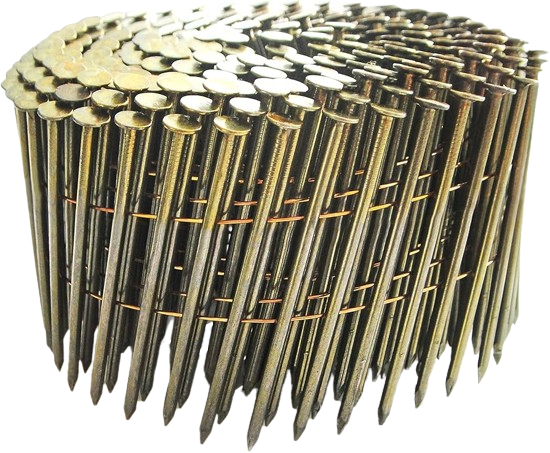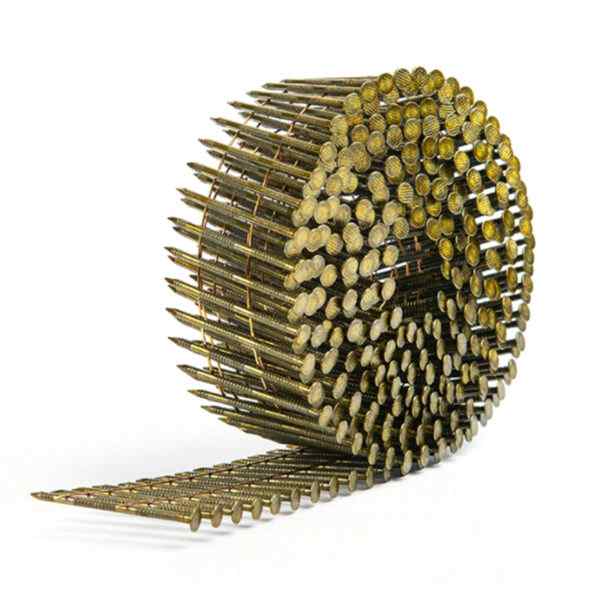Coil nails are a popular choice in construction and woodworking industries, offering efficiency and versatility for heavy-duty tasks. Their design and functionality make them an essential component of modern building practices, particularly when paired with coil nailers. In this blog, we’ll explore what coil nails are, their advantages, common applications, and how to choose the right ones for your projects.
What Are Coil Nails?
Coil nails are a type of fastener arranged in a circular coil, connected by thin wires or plastic strips. This configuration allows them to be loaded into coil nailers, which are pneumatic tools designed to drive nails quickly and efficiently. The coiled design offers high nail capacity, reducing the need for frequent reloading and improving productivity during projects.
Types of Coil Nails
Coil nails come in various materials, sizes, and finishes to suit different applications. The most common types include:
- Smooth Shank Coil Nails: These are standard nails suitable for general construction tasks. They’re easy to drive and ideal for projects where holding strength is less critical.
- Ring Shank Coil Nails: These nails have ridges along their shaft, providing extra grip and preventing the nail from loosening over time. They are commonly used in roofing and decking projects.
- Screw Shank Coil Nails: Designed with a twisted shank, these nails provide superior holding power and are often used in harder materials like hardwood or treated wood.
- Galvanized or Stainless Steel Coil Nails: These nails are treated to resist corrosion, making them ideal for outdoor applications such as fencing or siding.
Advantages of Coil Nails
Coil nails offer several advantages over traditional nail types, including:
- High Efficiency: The coiled design allows nailers to hold hundreds of nails at once, reducing downtime for reloading.
- Durability: Available in corrosion-resistant finishes, they’re ideal for projects exposed to the elements.
- Versatility: Suitable for a wide range of tasks, including roofing, siding, decking, and pallet building.
- Secure Fastening: Ring and screw shank nails provide superior holding strength, ensuring long-lasting results.
Common Applications of Coil Nails
Coil nails are used in various industries and projects. Some of the most common applications include:
- Roofing: Roofing coil nails are designed to secure shingles and withstand weather exposure.
- Siding: They are used to attach siding panels securely to building structures.
- Decking: Ring shank nails are often used in deck construction to ensure stability over time.
- Pallet Manufacturing: Coil nails are preferred for building and repairing wooden pallets due to their efficiency.
- Framing and Sheathing: They are suitable for structural projects requiring fast and secure fastening.
How to Choose the Right Coil Nails
Selecting the right coil nails depends on your project requirements. Here are a few tips to guide your decision:
- Consider the Material: For outdoor projects, choose galvanized or stainless steel nails to prevent rust and corrosion.
- Choose the Right Shank Type: Select smooth, ring, or screw shanks based on the required holding power and the material being used.
- Match Nail Length and Diameter: Ensure the nails are compatible with your nailer and appropriate for your project’s material thickness.
- Verify Compatibility: Check that the coil nails are compatible with your specific coil nailer model.
Maintenance Tips for Using Coil Nails
Proper handling and maintenance of coil nails can extend their lifespan and improve efficiency:
- Store in a Dry Place: Prevent rust and corrosion by storing nails in a moisture-free environment.
- Inspect for Damage: Check for damaged or misaligned nails before loading them into the nailer.
- Use the Right Nail Gun Settings: Adjust your coil nailer’s pressure settings to prevent overdriving or underdriving nails.
Available Sizes of Coil Nails
| Coil Nail 2.1 x 25mm (Smooth/ Screw/ Ring/ Galvanized) | 400 Nails x 40Coils (PER BOX) |
| Coil Nail 2.1 x 32mm (Smooth/ Screw/ Ring/ Galvanized) | 350 Nails x 40 Coils (PER BOX) |
| Coil Nail 2.1 x 38mm (Smooth/ Screw/ Ring/ Galvanized) | 350 Nails x 40 Coils (PER BOX) |
| Coil Nail 2.3 x 45mm (Smooth/ Screw/ Ring/ Galvanized) | 300 Nails x 30 Coils (PER BOX) |
| Coil Nail 2.3x 50mm (Smooth/ Screw/ Ring/ Galvanized) | 300 Nails x 30 Coils (PER BOX) |
| Coil Nail 2.3 x 56mm (Smooth/ Screw/ Ring/ Galvanized) | 300 Nails x 30 Coils (PER BOX) |
| Coil Nail 2.5 x 60mm (Smooth/ Screw/ Ring/ Galvanized) | 300 Nails x 20 Coils (PER BOX) |
| Coil Nail 2.5 x 65mm (Smooth/ Screw/ Ring/ Galvanized) | 300 Nails x 20 Coils (PER BOX) |
| Coil Nail 2.8 x 70mm (Smooth/ Screw/ Ring/ Galvanized) | 250 Nails x 20 Coils (PER BOX) |
| Coil Nail 2.8 x 75mm (Smooth/ Screw/ Ring/ Galvanized) | 250 Nails x 20 Coils (PER BOX) |
| Coil Nail 2.8 x 80mm (Smooth/ Screw/ Ring/ Galvanized) | 250 Nails x 20 Coils (PER BOX) |
| Coil Nail 2.8 x 90mm (Smooth/ Screw/ Ring/ Galvanized) | 250 Nails x 20 Coils (PER BOX) |
| Coil Nail 3.1 x 75mm (Smooth/ Screw/ Ring/ Galvanized) | 225 Nails x 20 Coils (PER BOX) |
| Coil Nail 3.5 x 100mm (Smooth/ Screw/ Ring/ Galvanized) | 150 Nails x 10 Coils (PER BOX) |
| Coil Nail 3.5 x 115mm (Smooth/ Screw/Ring/ Galvanized) | 150 Nails x 10 Coils (PER BOX) |
| Coil Nail 3.5 x 125mm (Smooth/ Screw/ Ring/ Galvanized) | 150 Nails x 10 Coils (PER BOX) |



